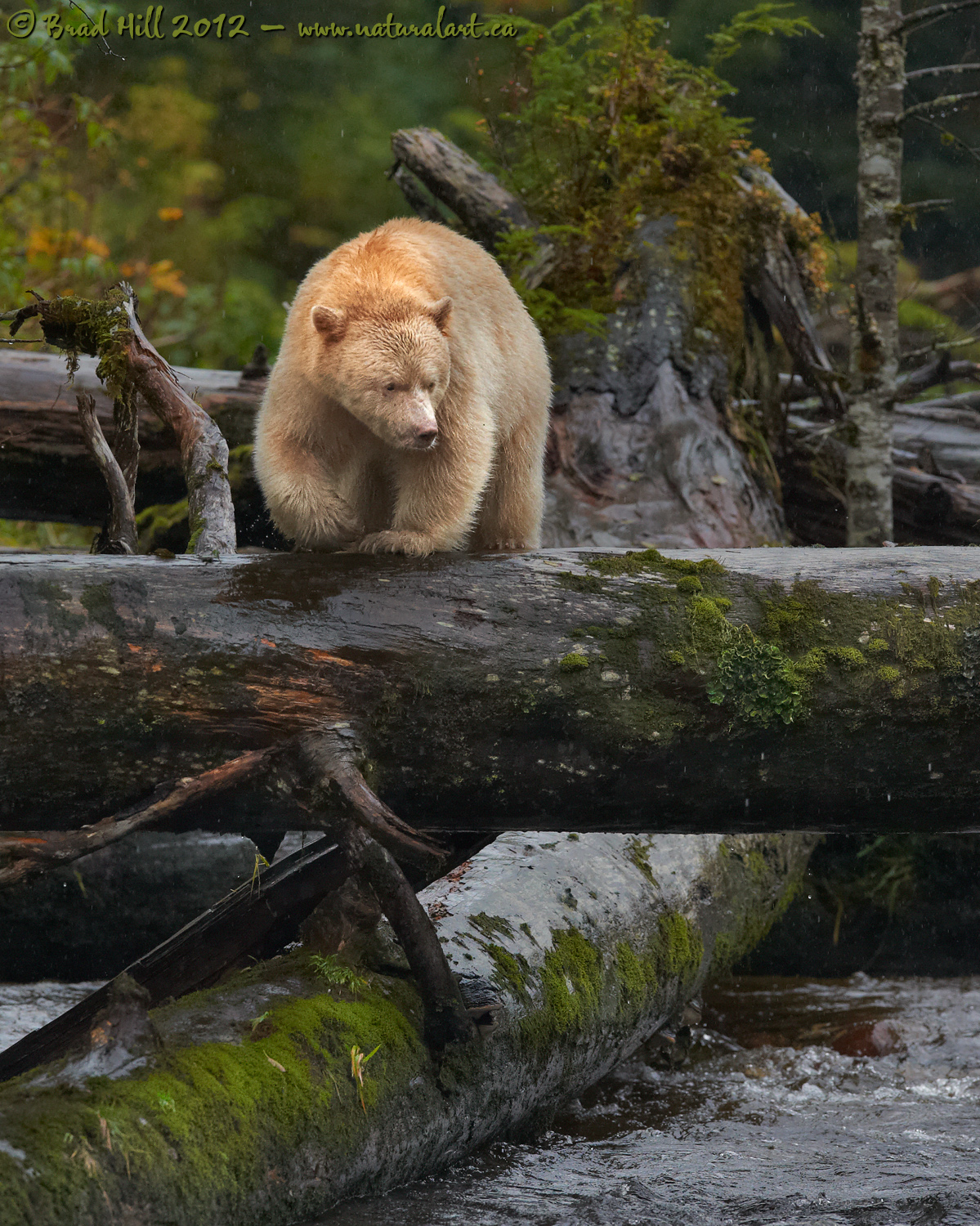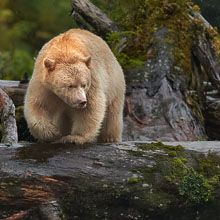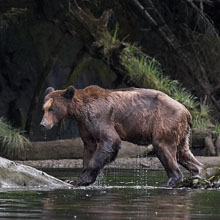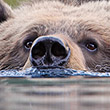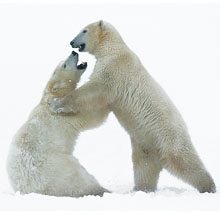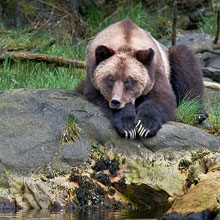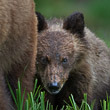Availability: Undetermined - Enquiries?
In the Field
Conquerer of the Obstacle Course. Great Bear Rainforest (on northern BC Coast), BC, Canada. September 29, 2011.
And yet one more enviroscape shot of a rare Spirit Bear in its preferred terrain - this one showing its physical superiority over humans by effortlessly conquering a log jam which would frustrate any two-legged pursuer - with or without a camera.
One of the challenges of producing a decent enviroscape (a shot which includes enough habitat features to show your subject within its chosen terrain) is balancing the inclusion of enough key habitat features with minimizing the number of true distractions. In some terrain (think of virtually any animal in a desert setting) this is no problem. But, more often than not, our furry and feathered friends prefer to avoid being seen, which means they like to inhabit areas with enough cover to hide them and in what we as photographers think of as "messy" scenes with distractions.
Spirit Bears are found only in a few areas within the Great Bear Rainforest, a habitat absolutely chock-full of distractions. One way to simplify these scenes and produce pleasing enviroscapes is to use longer focal length lenses to "sub-sample" a smaller (and hopefully "cleaner") portion of the field of view. And, it also helps to shoot with wider apertures to reduce your depth of field (or DoF) and use selective focus. In this shot I knew it was essential to soften up the background while keeping the subject (and foreground) sharp enough to "pop" out. So it was f5 on a 400mm f2.8 lens!
A more complete discussion surrounding the question of "Subject Size - Just How Big?" - including my thoughts on animalscapes, enviroscapes, and active portraits can be found right here on my "A Few Key Techniques" page.
ADDITIONAL NOTES:
1. This image - in all resolutions - is protected by copyright. I'm fine with personal uses of them (including use as desktop backgrounds or screensavers on your own computer), but unauthorized commercial use of the image is prohibited by law. Thanks in advance for respecting my copyright!
2. This image was captured during one of my autumn "Into the Great Bear Rainforest" photo tours in 2011. Each year I offer trips into two different parts of the Great Bear Rainforest as well as one to photograph marine mammals and oceanscapes near the northern tip of Vancouver Island. And, in selected years, I also offer photo tours to additional locations to capture other highly sought-after subjects, such as various boreal owl species, fishing grizzlies, and more. Details about these trips can be found on the Photo Tours page of this website.
3. Like all wildlife images on this website, the subject(s) is/are fully wild and completely unconstrained. Besides the potential impact of my/our presence, nothing has been done to intentionally alter or affect the ongoing behavior of the subject and, of course, there has been no use of any form of bait or other form of wildlife attractants (including vocalizations or other sounds).
Behind the Camera
Conquerer of the Obstacle Course. Great Bear Rainforest (on northern BC Coast), BC, Canada. September 29, 2011.
Digital Capture; RAW 14-bit format; ISO 3600.
Nikon D3s with Nikkor 400mm f2.8 VRII lens - supported on carbon fibre Gitzo 1348 tripod with Wimberley head. VR on and in "Normal" mode.
1/500s @ f5; no compensation from matrix-metered exposure setting.
At the Computer
Conquerer of the Obstacle Course. Great Bear Rainforest (on northern BC Coast), BC, Canada. September 29, 2011.
RAW Conversion to 16-bit TIFF, including first-pass/capture sharpening using Phase One's Capture One Pro 6. Three exposure variants covering a 1.8 stop total range, from -1.5 stops below original capture (to tame some of the bright reflections on the water surface and the shiny portions of the logs) to 0.3 stops above original exposure (for a few shaded regions on the bear).
Further digital corrections on resulting 16-bit TIFF files using Adobe's Photoshop CS5 and Light Craft's Lightzone. Photoshop adjustments including compositing (layering and masking) the exposure variants using both luminosity and manual masking techniques, selective colour saturation and desaturation, and selective sharpening for web output. Final tone tweaking performed using tonemapper/re-light in Lightzone.
Conservation
Conquerer of the Obstacle Course. Great Bear Rainforest (on northern BC Coast), BC, Canada. September 29, 2011.
Ten percent of the revenue generated by this image will be donated to Raincoast*.
Species Status in Canada**: Not currently listed as Threatened or Endangered.
The "Spirit" Bear is a rare genetically-based colour variant of the common Black Bear (Ursus americana). It has been estimated that less than 300 Spirit Bears exist today. Because the Black Bear is not considered under threat as a species, the Spirit Bear suffers from having the same conservation designation (it should be acknowledged that in British Columbia - the jurisdiction of greatest Spirit Bear abundance - hunting of these white-coated bears is not permitted). For reasons that are not fully understood, the Spirit Bear occurs with greater frequency in a relatively small geographic area within The Great Bear Rainforest of the central and northern coast of British Columbia. In this area 10 to 30% of the bears possess white coats. Many of the black-coloured Black Bears in this region carry the gene for white coats, so allowing hunting of ANY Black Bears in this region can reduce the frequency of the gene for white coats. Thus, to protect the Spirit Bear, it is necessary to prohibit the hunting of ALL Black Bears in this region. And, very unfortunately, the globally unique ecosystem that contains the Spirit Bear is under development pressure, especially from the forestry industry. If this unique environment is altered, we may lose the wonderful genetic anomaly known as the Spirit Bear forever.
*The Raincoast Conservation Society (and Foundation) is an effective and efficient organization that has been fighting for protection of this unique habitat. If you are looking for a meaningful way to contribute to the conservation of this amazing ecosystem, Raincoast will provide maximal "bang" for your conservation dollars.
**as determined by COSEWIC: The Committee on the Status of Endangered Wildlife in Canada












